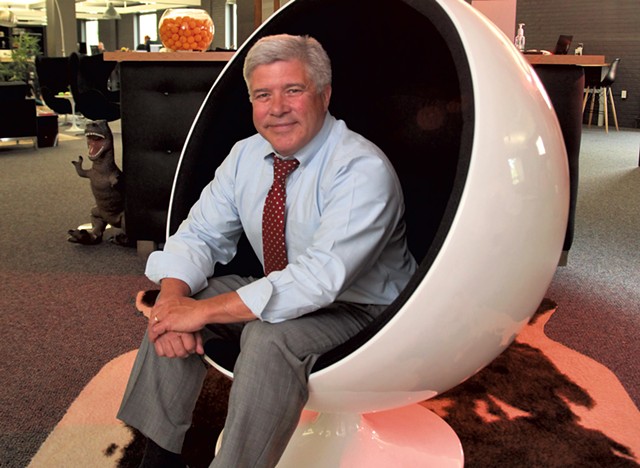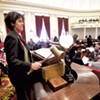Switch to the mobile version of this page.
Vermont's Independent Voice
- News
- Arts+Culture
- Home+Design
- Food
- Cannabis
- Music
- On Screen
- Events
- Jobs
- Obituaries
- Classifieds
- Personals
Browse News
Departments
Browse Arts + Culture
View All
local resources
Browse Food + Drink
View All
Browse Cannabis
View All
-
Culture

'Cannasations' Podcaster Kris Brown Aims to 'Humanize'…
-
True 802

A Burlington Cannabis Shop Plans to Host…
-
Business

Judge Tosses Burlington Cannabiz Owner's Lawsuit
-
Health + Fitness

Vermont's Cannabis Nurse Hotline Answers Health Questions…
-
Business

Waterbury Couple Buy Rare Vermont Cannabis License
Browse Music
View All
Browse On Screen
Browse Events
View All
Quick Links
Browse Classifieds
Browse Personals
-

If you're looking for "I Spys," dating or LTRs, this is your scene.
View Profiles
Special Reports
Pubs+More
Mike Smith Is the 'Interim Fixer-in-Chief'
Published June 17, 2015 at 10:00 a.m. | Updated October 8, 2020 at 4:36 p.m.
Burlington College was on the verge of collapse last September when Mike Smith found himself standing before a packed room of reporters, professors and students, telling it like it was.
"I have been to a lot of news conferences," the former administration secretary for Republican governor Jim Douglas told the tense crowd. "This is the first news conference where I've sweated."
Smith was indeed perspiring in the sweltering classroom, but in gray trousers and a pink tie, he was otherwise calm and collected. Under the circumstances, not too many people would have been. Over the weekend, Smith had agreed to serve as interim president of an offbeat institution that was $11 million dollars in debt, had maxed out its line of credit and was, quite literally, running out of cash. Four days earlier, angry students had ambushed the school's president, demanding that she resign — and she did.
It wasn't the first time the silver-haired Smith had stepped into a high-stakes situation — nor would it be the last. The 61-year-old ex-Navy SEAL has earned the informal title of Vermont's "interim fixer-in-chief," following in the footsteps of Ed Colodny, a Burlington native and former CEO of US Airways, who was called upon to lead the University of Vermont and Fletcher Allen Health Care during comparable periods of unrest.
In 2010, Smith came to the rescue of FairPoint Communications and spent roughly four years helping one of the state's largest providers of phone and internet service claw its way back from bankruptcy; if it had gone belly up, thousands of rural Vermonters could have lost their connections.
Now Smith has come to the aid of an under-the-radar board that oversees the state's 911 call centers. For at least a year, lawmakers have been questioning the cost and efficacy of the 10-person operation. They weren't reassured when the 911 system temporarily went down last winter and the Enhanced 9-1-1 Board fumbled its response. Several months later, executive director Dave Tucker resigned abruptly.
Worried that the legislature was going to disband the board or impose significant cuts, the group hired Smith as a consultant for six months to help them plot a survival strategy.
Why do desperate people keep turning to Smith, and what is it about this last-ditch deal maker that makes him keeping saying "yes?"
'Never Go With Your Gut'
Smith's SEAL status almost always comes up in conversations about him, but he said "dumb luck" led to his joining one of the Navy's elite, secretive "special-ops" teams. He was a D student at Woodstock Union High School when he signed up for the service. Smith, who has one younger brother, said his home life was in shambles at the time. His alcoholic father, then Woodstock's town manager, was on a downward spiral that forced the family to move from a house to an apartment to a trailer. If he hadn't joined the SEALS, Smith said, he might have wound up in jail.
Instead, at 19, he found himself in the Bolivian jungle with an order to blow up some logs that were preventing barges from delivering food to cities upstream. The instructions were in Portuguese, and Smith, assuming South American explosives would be less potent than American ones, decided to double the amount.
The explosion launched telephone pole-size logs 200 feet in the air, but no one was hurt.
The lesson he gleaned? "Never go with your gut."
Smith said the four years he spent parachuting, scuba diving and detonating explosives underwater turned his life around. It may also explain how he learned to keep his cool in the face of calamity.
He left the SEALs in 1975 to attend the University of Vermont, hitching a U-Haul to his Camaro and driving from Virginia straight to Burlington. He was assigned to a freshman dorm, where he didn't fit in. "People who had been in the service at that time weren't well-regarded on college campuses," Smith recalled of the post-Vietnam War era.
So he took a hiatus from college, surprising people — and upsetting some older Republicans — when he ran for state rep and unseated an incumbent of the same party. He didn't exactly tear up the legislature. Douglas, who was also a young lawmaker at the time, recalled that Smith was known for spearheading the bill that designated the honeybee as Vermont's state insect.
Smith's recollection: "What discouraged me as a freshman legislator was you couldn't change things as rapidly as I liked to see things change." After two forgettable years in Montpelier, Smith was ready to return to school.
Back at UVM, he got a bachelor's and a master's in political science. Despite benefiting from the G.I. Bill, Smith said he finished school broke and put his last semester on a credit card. He now sits on the board of the Vermont Student Assistance Corporation, a nonprofit agency that helps Vermont students pay for higher education.
After graduation, Smith spent 18 months as town manager of Hardwick — "one of the best jobs I've ever had" — then worked for five years at the Massachusetts Municipal Association, which lobbies on behalf of cities and towns in the commonwealth.
Back in Vermont, he made an unsuccessful bid in 1992 for state treasurer, losing to Democrat Paul Ruse Jr. Douglas was elected to that post three years later, and Smith worked under him as deputy treasurer until 1999. He was heading up a captive insurance firm when his old friend, just elected governor, offered him another, bigger job in 2002.
No Baloney
Secretary of administration doesn't have the same high-ranking ring as chief of staff or lieutenant governor, but it's actually one of the most powerful positions in state government. Longtime state senator-turned-lobbyist Vince Illuzzi described the job as "the governor's hatchet man."
"He was the guy who called people in and gave them the bad news," Illuzzi recalled of Smith. "He did very well at playing that role."
Members of Douglas' inner circle, who remain tight-knit, say Smith was demanding and direct but always fair. "He would never ask anyone to do anything he was unwilling to do himself," recalled then-press secretary Jason Gibbs, who often received late-night and early-morning messages from Smith.
Neale Lunderville, secretary of civil and military affairs under Douglas, described Smith as "extremely loyal."
That's a prerequisite for Dick Mazza, a powerful Democratic senator who has known Smith for decades. The two still meet every Monday morning at 6:30 a.m. at Mazza's Colchester general store. Last week, they were talking boats and cars, with an untouched pan of freshly baked cinnamon rolls on the counter between them. When the conversation turned to politics, Mazza started reminiscing about the days when Smith used to work the statehouse halls.
"When Mike Smith sets the agenda, that's the way it's going to be," Mazza said of the man across from him, in a black Ralph Lauren sweater and light khaki pants, who seemed a little embarrassed by the third-person treatment. "He ran a tight ship."
Undeterred by Smith's efforts to change the subject, Mazza recounted weekly meetings he sat in on with Douglas, Smith and then-Senate president pro tem Peter Shumlin. Smith and Shumlin often butted heads, Mazza recalled with a chuckle.
Former governor Douglas was less forthcoming, noting that those meetings were "private." But he did say, "Mike doesn't have a lot of patience for baloney. And he will call folks on it when he perceives it." A moment later, Douglas added, "I suppose there was a sort of good-cop, bad-cop dynamic. I didn't have to appear intemperate. I had others to fulfill that role."
Lunderville put it more cinematically: "Navy SEALs aren't known for being great diplomats. They are known for going in, guns blazing, full force but also for being highly trained, very smart and knowing exactly what to do."
Doing battle was only a part of it. Smith proved he had a softer side, too, while serving in the Douglas administration.
At his request, he briefly switched roles with Charlie Smith, who headed up the Agency of Human Services. He said he wanted to get to the bottom of a projected $600 million Medicaid deficit.
At first, advocates and lawmakers were concerned about a fiscally conservative military man coming in on a cost-saving mission to an agency that serves the state's most vulnerable residents. Heidi Tringe, a Douglas staffer who also worked for the AHS, said there was the sense that "he doesn't know this world." But, she continued, "I think he proved that wrong pretty quickly."
In 2005, Smith played a key role in securing what's called a Global Commitment waiver that helped alleviate the deficit and allowed the state to spend its federal Medicaid dollars more freely. Lunderville, who traveled with Smith to Washington, D.C., to lobby for waiver, said, "It was Mike's tenacity and whipping of the hounds that got it across the finish line."
When asked about accomplishments in state government, Smith doesn't focus on his fiscal prowess. Instead, he returns to his role in extending the termination date for state benefits for youths in foster care from age 18 to 21. He convinced Douglas to hold a summit at the statehouse for foster children, directly soliciting their opinions about how to improve services. "He cares deeply about people who need an extra hand," said the former governor.
Mark Redmond, executive director of Spectrum Youth & Family Services, recalled Smith delivering an emotional speech about his own troubled upbringing. Smith now serves on Spectrum's board.
In his temporary office at the Enhanced 9-1-1 Board, Smith was eager to show off two papers tacked to the bulletin board. They were apology letters from children who had prank-called 911 — one of whom confessed to doing so 30 times. Smith seemed to identify.
Pointed but Fair
Smith left the Douglas administration in 2008, before the recession hit. To unwind, the once avid mountain climber and speed skier took a solo motorcycle trip through Canada. Then he started a website for seniors called Active Geezering — thinking, perhaps, that he might have more time to run, bike, kayak and cross-country ski with his wife of 30 years.
Not quite. When the next job offer came — from Fairpoint — the company was already in bankruptcy. "I said, 'Boy, this is going to be very interesting and very challenging,'" Smith recalled. The company had recently purchased Verizon's assets, a move that contributed to its financial duress and created major disruptions to people's service.
As FairPoint's state president, Smith played a key role convincing the Vermont Public Service Board to sign off on FairPoint's plan to get out of Chapter 11. He also worked with the Public Service Department and the state legislature to ease regulations — dating back to an era where phone companies enjoyed monopolies — that applied to FairPoint but not its competitors.
The department's commissioner at the time, Liz Miller, described Smith as "forthright" and "fierce." "He'll always be straight up with you about why he's advocating for his position," said Miller, who recently stepped down as Shumlin's chief of staff.
Jim Porter was the department's attorney, and later its telecommunications director, during Smith's tenure. Despite "herculean" battles with the telecommunications company, Porter had only kind things to say about Smith, whom he described as a "formidable opponent."
"I very much appreciated his style," Porter said. "You always know where you stand with Mike. If he tells you something, you can take it to the bank."
At the time, the company and the Public Service Department were haggling over roughly $6 million that FairPoint owed its customers in penalties for poor service. Porter thought FairPoint could have gotten out of paying it back by "disposing of it as debt." Instead, Smith helped broker a settlement in which the company devoted $6 million to expanding broadband to parts of the state that were unserved.
That deal in particular left Porter with the impression that Smith had not just FairPoint's but also the state's best interests at heart.
Frank Cioffi, who chairs the Vermont Center for Emerging Technologies, got the same impression when Smith helped him orchestrate a deal with FairPoint shortly after leaving his post as president.
VCET wanted to start an incubator space in downtown Burlington. FairPoint had 11,000 square feet of vacant space at its Main Street headquarters. Smith played matchmaker, connecting the two.
Surrounded by urban-chic art and gadgetry in the new coworking space last Tuesday, Smith beamed as Cioffi listed its economic benefits — seed capital, business advisers, networking opportunities — and the companies taking advantage of it.
But not everyone has fond memories of Smith's legacy at Fairpoint.
Mike Spillane, business manager for IBEW Local 2326, called Smith "one of those strange fellows" who never really connected with the FairPoint workers. "I think Mike was brought in for a specific task, and he completed the task and moved on," he said.
Back to School
In the year after he left, Smith continued to do some consulting work for FairPoint. He also advised South Burlington on several projects, including its plan to develop a city center. And he wrote — he's chipping away at a book about leadership.
Last September, he set the book aside for an assignment that would require plenty of it. Smith said helping to stabilize Burlington College ranked right up there with SEAL training as one of the hardest things he's ever done. He took the assignment with Jane Knodell, a city councilor and UVM professor, and David Coates, a well-known businessman.
The mission began inauspiciously. When Smith stepped down from the podium at that first press conference, a group of students strode to the front of the room, impugning the board for picking interim leaders without their input. Faculty were also wary, and privately, some questioned why the board had selected a consummate Republican with no ties to the school.
The interim leadership team quickly ditched the previous administration's long-term plan to develop the college's lakefront campus, deeming it unviable. Within a month they had devised a new deal, selling most of the land to a private developer who had already agreed to work with the school.
The highly controversial decision spawned a citizen group that is now trying to prevent the land from being developed. But according to Smith, it was the college's only shot at survival.
Putting an end to months of spin and evasion on the part of the college, Smith summoned reporters one by one to his temporary corner office overlooking the lakefront lawn. Armed with a map of the campus property, he explained in detail the terms of the deal. He didn't dodge any of the follow-up questions and was frank about the college's prospects, noting that the sale would simply buy it more time. "Our debt service is literally bleeding us to death," he said at the time.
Coates, acting as the interim financial adviser, said he was astounded by Smith's openness throughout the process: "I've never seen anybody do that before."
Knodell, brought on as an interim academic adviser, said Smith was "very cordial, very professional and very tough" when negotiating with the college's debtors. He was also up-front with faculty and staff. "I think they felt for the first time that someone was giving them the straight story, not sugarcoating it, not spinning it and not withholding anything."
Jared Carter, a Vermont Law School professor who was on Burlington College's faculty at the time, corroborated Knodell's account. "He was always, I thought, very respectful of the faculty, inclusive, and had grown-up conversations with us," he said.
Carter recalled one meeting in particular that Smith convened to tell faculty that the college could no longer contribute to their retirement funds and would have to reduce health care contributions. People were upset, he said, but they appreciated that Smith broke the news in person. And at the end of the meeting, they told him so. "It was kind of funny," Carter said. "People were thanking him for cutting our benefits."
Mission Accomplished?
You could argue that Smith saved the day at both FairPoint and Burlington College — but it's still unclear whether either entity will survive. Neither the company nor the college is yet on solid financial footing.
"He's a confident guy and a quick learner," said Illuzzi, who partnered with Smith to pass legislation making it easier for FairPoint to win business, "but his attention span is getting shorter and shorter."
Mazza had a slightly different take: "He loves getting into a challenge, and once it's stabilized, Mike likes to move on."
Miller dubbed him "interim fixer-in-chief."
Not everyone is pleased about Smith's latest mission. Sen. Tim Ashe (D/P-Chittenden), who chairs the finance committee, has been leading the charge to restructure the Enhanced 9-1-1 Board. He noted that before Smith came in, the administration had already found a way to save significant amounts of money — by moving the board to the Department of Public Safety.
Ashe views Smith's up-to-$70,000 contract as a costly attempt at self-preservation on the part of the board. "I think it's ridiculous that the Enhanced 9-1-1 Board hired anyone as a consultant," he said. "I think Mike is a fine person to pick, if you're going to pick someone, but it's for work that is unnecessary and has already been done."
FairPoint is taking over the state's 911 contract in July, but Smith said he'd recuse himself from any decisions that involve his former employer.
Smith was at the Enhanced 9-1-1 Board office in Montpelier when Shumlin announced that he wouldn't seek a third term. A regular political commentator for WCAX-TV, he was summoned to its studio in South Burlington, along with his Democratic counterpart, Steve Terry, to opine on the news.
But before taping the segment, Smith had to quash his companion's suggestion that he might make a bid for the Fifth Floor.
Terry was teasing, but Smith's many media gigs — he also writes a weekly column for a number of local newspapers and appears on WVMT's "Charlie + Ernie + Lisa in the Morning" every Monday — have caused people to wonder.
Smith is adamant that he's got no ambition to run for anything — "No, no, no, I've been there, done that," he says peremptorily. Douglas, too, dismissed the notion.
The ex-gov has a different gig in mind for his former right-hand man, a Westford resident who has a summer place on Isle La Motte. For years, a cadre of successful Burlington-area businessmen, known as "the Burlington Bishops" or "the Chittenden County Mafia" have acted as informal advisers to governors on both sides of the aisle. Coates is one of them, along with retired Harlan Sylvester of Morgan Stanley Smith Barney.
"At some point, they'll begin to fade from the scene, and there will need to be some other bishops," Douglas predicted. "I think Mike is naturally falling into that role."
He's already a mentor to a number of Douglas administration alumni, including Lunderville, who recently said he'd consider running for governor if Lt. Gov. Phil Scott opts not to.
Republicans aren't alone in considering him a resource. Knodell, the Burlington City Council president and former UVM provost, said she "learned a lot from him about leadership," when they worked together at Burlington College. In her most recent gig, even Miller trusted the man who regularly bashed her boss on TV to dole out wisdom. "He's looked to — including by me — as someone you can go to for advice," she said.
The original print version of this article was headlined "'Interim Fixer-in-Chief'"
Related Stories
Got something to say?
Send a letter to the editor
and we'll publish your feedback in print!
Tags: Business, Mike Smith, Burlington College, FairPoint, technology
More By This Author
About The Author

Alicia Freese
Bio:
Alicia Freese was a Seven Days staff writer from 2014 through 2018.
Alicia Freese was a Seven Days staff writer from 2014 through 2018.
About the Artist

Matthew Thorsen
Bio:
Matthew Thorsen was a photographer for Seven Days 1995-2018. Read all about his life and work here.
Matthew Thorsen was a photographer for Seven Days 1995-2018. Read all about his life and work here.
Speaking of...
-

Burlington Area Selected as Semiconductor 'Tech Hub'
Oct 25, 2023 -

New Interim President Appointed at Vermont State University
Sep 22, 2023 -

Pass or Fail? Newly Branded Vermont State University Needs More Students — but Its Enrollment Is Declining
Aug 16, 2023 -

Vermont State Colleges Reverse Library Layoffs, Athletics Shakeup
Apr 24, 2023 -

Vermont State University President Resigns; Library Plan Shelved
Apr 14, 2023 - More »
Comments
Comments are closed.
From 2014-2020, Seven Days allowed readers to comment on all stories posted on our website. While we've appreciated the suggestions and insights, right now Seven Days is prioritizing our core mission — producing high-quality, responsible local journalism — over moderating online debates between readers.
To criticize, correct or praise our reporting, please send us a letter to the editor or send us a tip. We’ll check it out and report the results.
Online comments may return when we have better tech tools for managing them. Thanks for reading.
- 1. Property Tax Relief Bill Sparks Partisan Feud News
- 2. More Vermont Seniors Are Working, Due to Financial Need or Choice. They May Help Plug the Labor Gap. This Old State
- 3. Burlington Mayor Emma Mulvaney-Stanak’s First Term Starts With Major Staffing and Spending Decisions Politics
- 4. Town of Roxbury Sues Over Budget Vote That Could Close Its School Education
- 5. The $200 Mystery: Anonymous Person Mails Cash to Multiple Winooski Residents True 802
- 6. Home Is Where the Target Is: Suburban SoBu Builds a Downtown Neighborhood Real Estate
- 7. State Will Build Secure Juvenile Treatment Center in Vergennes News
- 1. Florida School Administrator Appointed Vermont's Next Education Secretary Education
- 2. Totally Transfixed: A Rare Eclipse on a Bluebird Day Dazzled Crowds in Northern Vermont 2024 Solar Eclipse
- 3. Zoie Saunders, Gov. Scott’s Pick for Education Secretary, Faces Questions About Her Qualifications Education
- 4. Don't Trash Those Solar Eclipse Glasses! Groups Collect Them to Be Reused 2024 Solar Eclipse
- 5. Burlington City Council Approves Rezoning Plan to Boost Housing Supply News
- 6. State Will Build Secure Juvenile Treatment Center in Vergennes News
- 7. Rising Costs and Property Tax Hikes Again Threaten the Survival of Small Schools Education
















































